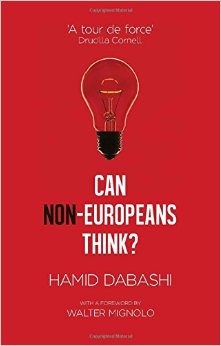What happens to thinkers who operate outside the European philosophical pedigree? In his provocatively titled new book, Can Non-Europeans Think?, Hamid Dabashi argues that they are invariably marginalised, patronised and misrepresented, and that this intellectual debate reinforces a colonial regime of knowledge. In this interview, he discusses his ideas.

The book started with your Al-Jazeera essay of the same title. What prompted you to write it?
The essay I published in Al-Jazeera more than two years ago, subsequently expanded into this book, reflects a much larger frame of reference than being prompted by a single incident. My entire scholarship of the last four decades you might say has been concerned with the issue of knowledge and power, long before Edward Said’s seminal text. In fact I'd trace the issue to a point long before Michel Foucault formulated the question. My concern goes back to the sociology of knowledge, which as a field deeply interested me from my graduate school years at the University of Pennsylvania in the late 1970s. But obviously the events after the rise of a revolutionary momentum in the Arab and Muslim world, with its echoes extending from Europe to Africa and the Americas, foreground my thinking in this book.
Have you personally felt frustrated at the way European thought dominates scholarship?
Not really. I am not “frustrated” by anything, least of all by European thought, from which I am a beneficiary. I just think a particular mode of thinking, even in its most critical aspects, after a while exhausts its epistemic possibilities. It is a period now - in fact it has been for quite some time - to overcome those limitations, but with no malice or vengeance or antagonism against multiple and varied modes of thinking that have originated in Europe. So a location within a crosscurrent of history, rather than a “frustration,” informs the thinking behind this book.
You talk about the way that “the West” has become a measure of truth. Can you expand on that?
Yes: the manner in which we think and seek to understand the world is always assimilated backward to various schools of European thinking, as if the world must in one way or another explain itself, in its multiple domains of epistemic possibilities, to a fictive white male European interlocutor sitting in our mind and asking us questions. My whole point is to point out that the proverbial emperor has no clothes, that this white male interlocutor is a figment of imagination. It does not exist. We are free.
How can this assumption be overcome?
By allowing multiple realities around the globe teach us their own idiomaticities. There are emerging measures of truth from four corners of the world, from the cyberspace to the outer space, with fragile earth and a deeply vulnerable humanity in between. We need to allow these realities to expose themselves and teach us how to read them. From Plato and Aristotle (who saw themselves as Greek, not as “European”), down to subsequent generations of thinkers and philosophers: they were reading their own time, with little to no attention to what their predecessors had said. We too need to do as they did—though with a far more cautionary attitude not to universalise too much our passing particulars.
How do these issues – the centralising of European thought – manifest outside of philosophy, in wider society?
They manifest themselves everywhere: In science, in technology, in politics, etc. This does not mean the world at large bends backward and plays dead and follows through. The world is always in a state of revolt. The question is the manner and the facilities of hearing the world think and do and feel and above all act differently. Some leading European philosophers today have inherited this bad habit of universalising their particulars, and when they come to say anything about a particular non-European location they look completely out to lunch. This in part comes from the manufactured tradition of “Western thought,” which simply refuses to acknowledge the fact that even if the ancient Greeks were to be taken as the center of universe (they were not—but let’s assume they were) their ideas had repercussions and consequences far beyond the territorial assumptions of “the West.”
You talk about moving beyond post-colonialism. Why is it necessary to do so?
Because the world at large has moved beyond a particular mode of domination occasioned by European colonialism and underlined by the period and movement we call postcolonialism. We need to be mindful of the organicity of the relation of power and domination and not fetishise any particular period, episode, or codification of it. We are, I contend, at a ground zero of history, once again, when the matrix of coloniality of the nineteenth and twentieth centuries no longer hold. We are living through an amorphous empire that has occasioned its own imperial modality. Hard and Negri’s arguments in their Empire trilogy, though still quite Eurocentric, are largely persuasive. I find a thinker like Kojin Karatani far more persuasive in outlining the imperial location of power that now embraces us, though I think Giacomo Marramao’s most recent work is equally pathbreaking.
Your book explicitly refers to the legacy of colony – for instance the fact that non-European thinkers often write in European languages. Is this a problem?
No, it is not a problem. Right now you and I are conducting this interview in English and there is no problem. Languages belong to the people who speak them, not people to the language they speak. All colonial and imperial languages carry within them the seeds of resistance and defiance once the people of the former colonies began to master the means of their own suppression. There is a difference between the English that Rudyard Kipling, Thomas Babington Macaulay, Winston Churchill, Thatcher, or David Cameron speak, and the English that Edward Said, Gayatri Spivak, or Chinua Achebe write. This is not to deny the fact that English, French, or German does not have certain linguistic and epistemic limitations. They do. But the alternative of writing in Arabic, Chinese or Swahili does not necessarily mean the language itself or the author who writes in them is emancipated. Any of the languages of Asia or Africa can be as “colonial” as European languages can be. Plus the fact that the most revolutionary and emancipatory ideas can also be delivered in European languages. The question is therefore to allow - both politically and linguistically - the fact of our multilinguality to become the premise of epistemic and philosophical heteroglossia. That is the premise to which my book points.
You write that it isn’t surprising that European philosophers are Euro-centric. In that case, how would you like to see them respond to non-European thought?
By learning how to read: to read other thinkers’ thoughts without assimilating them backward into what they already know - like learning a new language that has its own grammar, syntax, and morphology. We should not approximate and assimilate the new language we are learning back into the grammar of the language we already know. As we must read, write, and speak Arabic or Bengali in their own grammar and with their own idiomaticities, so must alternative thoughts, visions, perspectives be encountered in terms domestic to their particularities. We must listen to jazz as jazz and not as distorted Beethoven. The Bhagavad Gita and the Shahnameh are not Homeric epic in Sanskrit and Persian.
How would you like attitudes to change more generally?
By allowing the unfolding world, and the worlds historically camouflaged under the generic distortion of “the West and the Rest,” teach us the new language of what they were and what is unfolding. Today a new regime of knowledge is surfacing from a tumultuous world. We just need to learn how to listen and learn.
Is Orientalism as a concept still useful?
Of course it is - though it is in need of constant refinement and critical articulation. The term, as Edward Said designated it in his seminal text, was limited in its theoretical implications but profoundly liberating in marking a particular relation of knowledge and power. The particularities of that relation change (as I have argued and demonstrated in my book on Post-Orientalism: Knowledge and Power in Time of Terror), but the fact of that relation remains constant. So instead of fetishising the term we need to keep its organicity alive and responsive to changing realities. Said’s work was groundbreaking, and precisely for that reason it requires further refinement, both along the lines he foresaw and lines he did not. What has unfortunately happened to this term is its having become talismanic, a catch phrase, bereft of its theoretical potency. People use it to discredit things they don’t like. That’s mental laziness. They need to specify what it is they are criticising. Our task today is to continue Said’s and Foucault’s work (and long before them the work of a whole tradition in sociology of knowledge that goes back to Max Sheller and Karl Marx) in unearthing the hidden relations between knowledge and power, not conceal them by this catch phrase.

